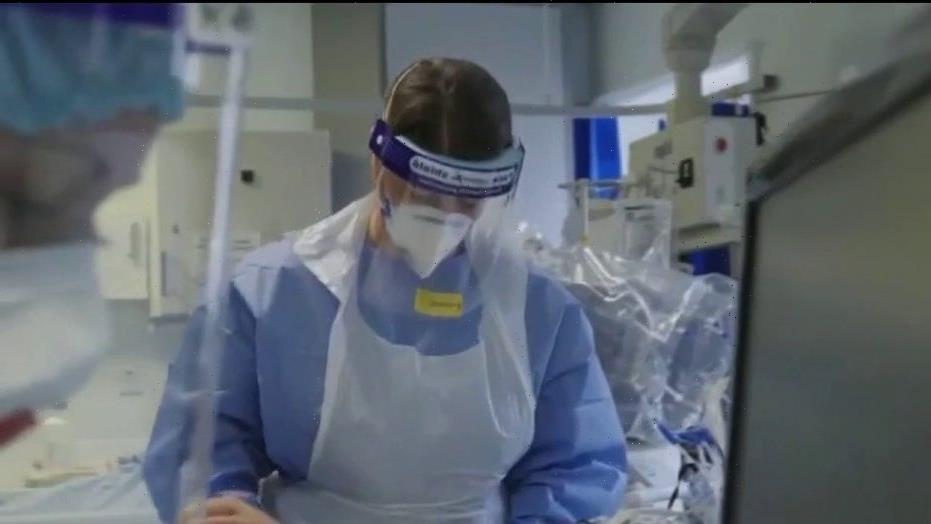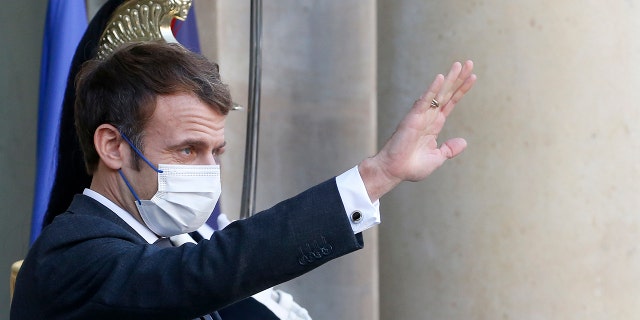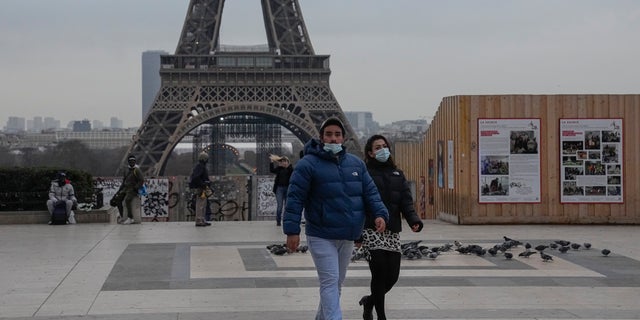Omicron variant causes fear as it continues to spread rapidly
Fox News correspondent Jonathan Serrie reports the latest on ‘Special Report’ as the virus spreads faster than previous variants.
France will sharply restrict travel to and from Britain because of fast-spreading cases of the omicron coronavirus variant, putting limits on reasons for traveling and requiring 48-hour isolation upon arrival, the government said Thursday.
The move suddenly disrupted travel plans for families and others on both sides of the English Channel. Travelers questioned whether the measures were politically driven, and U.K. officials suggested they were pointless.
With omicron now seeded around the world, “red list” travel bans “wouldn’t be effective or proportionate,” said British Prime Minister Boris Johnson’s spokesman, Max Blain. He said Johnson hadn’t spoken to French President Emmanuel Macron about the move, and that Britain doesn’t plan to take a reciprocal measure.
French President Emmanuel Macron wearing a protective face mask waves in Paris, France. (Getty Images)
(Chesnot/Getty Images)
A puzzling element of the new French rules was that those targeting Britain are softer than those targeting South Africa — even though Britain’s infection numbers are currently higher. There was no immediate explanation for why.
South Africa’s tourism officials said the restrictions for their country appeared to be aimed at discouraging people in France from traveling to South Africa, because they will face a long and costly quarantine after their return.
“It is unfortunate that once again South Africa seems to be discriminated against with no scientific basis,” said Steve Motale, a spokesman for the country’s tourism department.
Emmanuelle Gille, who traveled from Johannesburg to Paris on Thursday, called the French restrictions on arrivals from South Africa “disproportionate and unjustified.” She said the harsher rules, compared to those for travelers from Britain, are “very unfair.”
“There is a double standard.,” Gille said.
French government spokesman Gabriel Attal said on BFM television that tourism and business travel to and from Britain will be strongly curtailed, and all those arriving from Britain will need to have a negative virus test less than 24 hours old, and to test again upon arrival and isolate “in a place they choose” for at least 48 hours pending the result.
All people arriving from South Africa must quarantine for 10 days, with a 1,000-euro ($1,130) fine if the quarantine is breached or shortened and a mandatory test on arrival.
People wearing face masks to protect against COVID-19 cross the Trocadero Plaza in Paris, Wednesday, Dec. 15, 2021. (AP Photo/Michel Euler)
The new French measures will take effect first thing Saturday, just after midnight, French Prime Minister Jean Castex said in a statement. They will apply to vaccinated travelers as well those not vaccinated. The French government is holding a special virus security meeting Friday that will address growing pressure on hospitals from rising infections in recent weeks.
Londoner Derek Lubner made it to Paris on Thursday just ahead of the deadline. “It’s crazy. (Omicron) is already spreading in France,” he told the Associated Press at the Gare du Nord train station. “I mean I understand they need to protect the people but it’s here. What can you do? And it’s gonna hurt people. It hurts people, it hurts tourists, it hurts your local businesses.”
People wait in a queue to receive a vaccination against Covid-19 at a temporary centre set up at Selhurst Park football stadium in Croyden, south London (Photo by JUSTIN TALLIS/AFP via Getty Images)
(Photo by JUSTIN TALLIS/AFP via Getty Images)
U.K. travel industry officials expressed dismay at the French restrictions, demanding government help for battered businesses.
“The winter sports and school travel markets are particularly exposed, and the government must now bring forward a support package if we are not to see company failures and job losses,” said Mark Tanzer, chief executive of travel and trade association Abta.
There are several hundred flights scheduled between Britain and France over the week leading up to Christmas, according to aviation analytics firm Cirium. That’s the equivalent of more than 90,000 seats, though the new restrictions mean they are likely to be largely empty.
The U.K. recorded the highest number of confirmed new COVID-19 infections Wednesday since the pandemic began, and England’s chief medical officer warned the situation is likely to get worse as the omicron variant drives a new wave of illness during the Christmas holidays.
According to France’s new measures, citizens of any EU country can still enter France from Britain, in addition to non-EU citizens with a long-term EU residency permit or long-term visa, and some other categories of people including truckers who are only transiting France, diplomats and health care workers. All other foreigners are not allowed in.
People will only be allowed to leave France for Britain if they aren’t French, or if they have an urgent health or legal reason to travel.
CLICK HERE TO GET THE FOX NEWS APP
The abrupt move comes after weeks of political tensions between France and Britain over post-Brexit fishing rights and how to deal with migration in dangerous small boats across the English Channel.
It also comes as France’s government is desperately trying to avoid a new lockdown or stricter measures that would hurt the economy and cloud President Emmanuel Macron’s expected campaign for the April presidential election.
Source: Read Full Article




